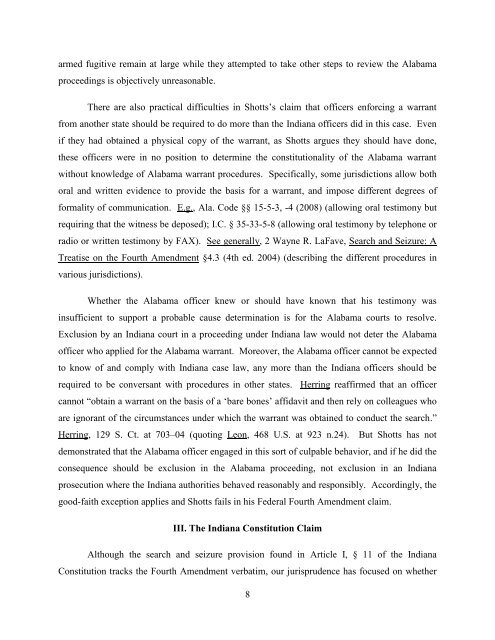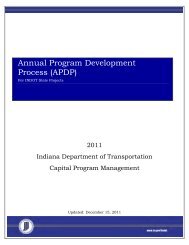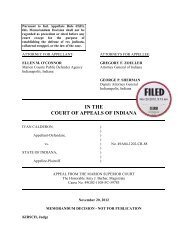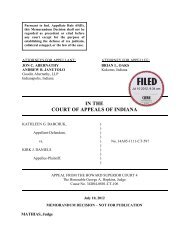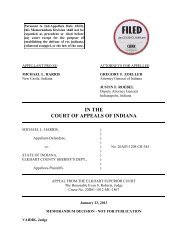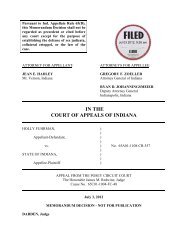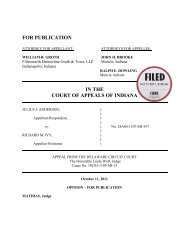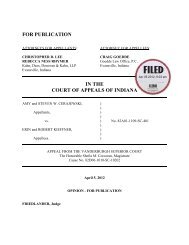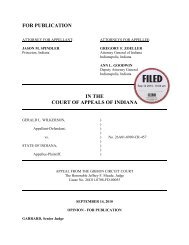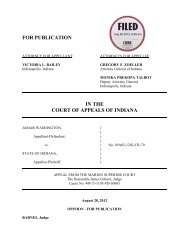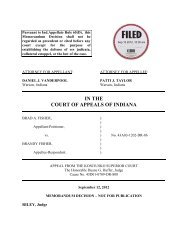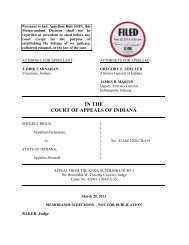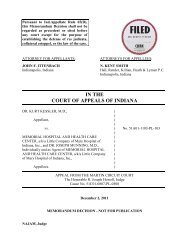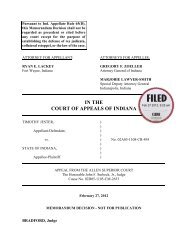David A. Shotts v. State of Indiana
David A. Shotts v. State of Indiana
David A. Shotts v. State of Indiana
You also want an ePaper? Increase the reach of your titles
YUMPU automatically turns print PDFs into web optimized ePapers that Google loves.
armed fugitive remain at large while they attempted to take other steps to review the Alabama<br />
proceedings is objectively unreasonable.<br />
There are also practical difficulties in <strong>Shotts</strong>‘s claim that <strong>of</strong>ficers enforcing a warrant<br />
from another state should be required to do more than the <strong>Indiana</strong> <strong>of</strong>ficers did in this case. Even<br />
if they had obtained a physical copy <strong>of</strong> the warrant, as <strong>Shotts</strong> argues they should have done,<br />
these <strong>of</strong>ficers were in no position to determine the constitutionality <strong>of</strong> the Alabama warrant<br />
without knowledge <strong>of</strong> Alabama warrant procedures. Specifically, some jurisdictions allow both<br />
oral and written evidence to provide the basis for a warrant, and impose different degrees <strong>of</strong><br />
formality <strong>of</strong> communication. E.g., Ala. Code §§ 15-5-3, -4 (2008) (allowing oral testimony but<br />
requiring that the witness be deposed); I.C. § 35-33-5-8 (allowing oral testimony by telephone or<br />
radio or written testimony by FAX). See generally, 2 Wayne R. LaFave, Search and Seizure: A<br />
Treatise on the Fourth Amendment §4.3 (4th ed. 2004) (describing the different procedures in<br />
various jurisdictions).<br />
Whether the Alabama <strong>of</strong>ficer knew or should have known that his testimony was<br />
insufficient to support a probable cause determination is for the Alabama courts to resolve.<br />
Exclusion by an <strong>Indiana</strong> court in a proceeding under <strong>Indiana</strong> law would not deter the Alabama<br />
<strong>of</strong>ficer who applied for the Alabama warrant. Moreover, the Alabama <strong>of</strong>ficer cannot be expected<br />
to know <strong>of</strong> and comply with <strong>Indiana</strong> case law, any more than the <strong>Indiana</strong> <strong>of</strong>ficers should be<br />
required to be conversant with procedures in other states. Herring reaffirmed that an <strong>of</strong>ficer<br />
cannot ―obtain a warrant on the basis <strong>of</strong> a ‗bare bones‘ affidavit and then rely on colleagues who<br />
are ignorant <strong>of</strong> the circumstances under which the warrant was obtained to conduct the search.‖<br />
Herring, 129 S. Ct. at 703–04 (quoting Leon, 468 U.S. at 923 n.24). But <strong>Shotts</strong> has not<br />
demonstrated that the Alabama <strong>of</strong>ficer engaged in this sort <strong>of</strong> culpable behavior, and if he did the<br />
consequence should be exclusion in the Alabama proceeding, not exclusion in an <strong>Indiana</strong><br />
prosecution where the <strong>Indiana</strong> authorities behaved reasonably and responsibly. Accordingly, the<br />
good-faith exception applies and <strong>Shotts</strong> fails in his Federal Fourth Amendment claim.<br />
III. The <strong>Indiana</strong> Constitution Claim<br />
Although the search and seizure provision found in Article I, § 11 <strong>of</strong> the <strong>Indiana</strong><br />
Constitution tracks the Fourth Amendment verbatim, our jurisprudence has focused on whether<br />
8


